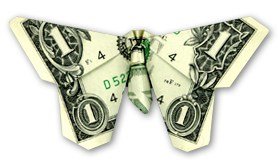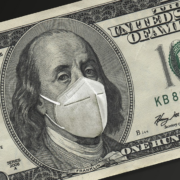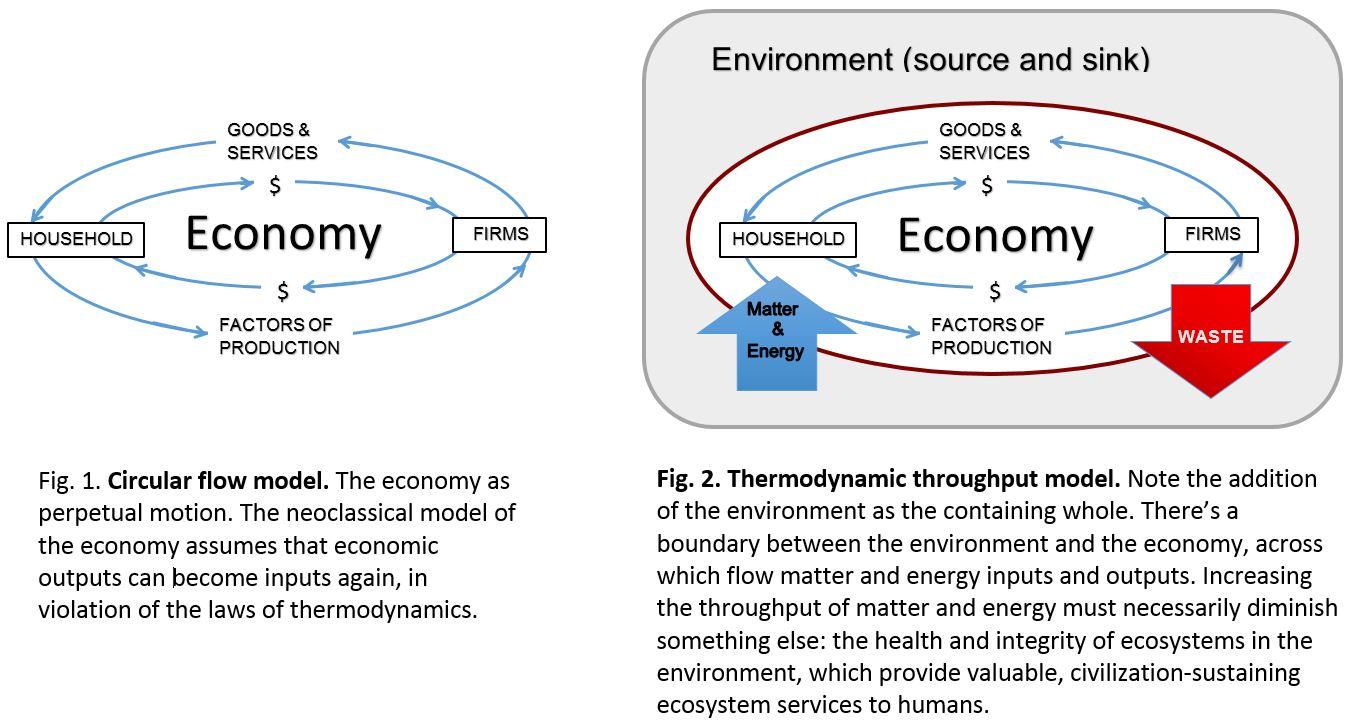Good News: Economic Recovery Stalls!
by Dave Gardner, director of the upcoming documentary GrowthBusters
 Economic news last Friday was quite positive. Annualized U.S. GDP growth was less than one percent in the first half of 2011.
Economic news last Friday was quite positive. Annualized U.S. GDP growth was less than one percent in the first half of 2011.
However, I would hazard a guess that, oh, some 99.9 percent of the world considered this bad news. It was characterized in the New York Times as a “snail’s pace.” Journalists and commentators around the world are predictably typing out words like weak, anemic, malaise, gloomy, bleak, doldrums and stagnation.
So why would I celebrate? Do I get perverse, morbid pleasure at seeing my fellow humans unemployed, upside down in their mortgages, or dining at soup kitchens? I do not. The fallout of the recession is real, it’s painful, and it’s sad. But steady or declining GDP is not bad news. Nor is the drop in consumer spending reported Tuesday.
While many impacts of the recession are tragic, these are the pains of adjusting to a new reality: the end of growth. They are a necessary part of a temporary phase. We might call it the cocoon phase, as we metamorphose into something more beautiful.
Consider these headlines from the past two years. Are they good news or bad?
- Recession Puts Babies on Hold
- Tiny House Movement Thrives Amid Real Estate Bust
- Home Production Falls as Economy Languishes
- Global Coal Use Stagnates Despite Growing Chinese and Indian Markets
- Total Municipal Waste Generation Dropped
- Home Depot Calls a Halt to Rapid Expansion
- European Union Carbon Pollution Drops
- GM to Close Hummer
- Gasoline Spike Fuels Surge in U.S. Bicycle Sales
- Bottled Water Consumption Growth Slows
- 30-Year Growth Spurt Ends for Average American House Size
- Ad Spending Down
- Airlines Ground More Than 11% of Their Jets
- Breast Implants are Deflating Along With the Economy
- More Than 400 Meetings in Las Vegas Recently Cancelled
- 2nd Home Market Declined 30%
Looking at these headlines through an archaic lens, last century’s worldview that growth is the Holy Grail, these stories seemed like bad news. But through a more modern, 21st century lens that values true sustainability, they herald a world slowing down toward a responsible level of human activity.
Think about it. Smaller houses mean less deforestation, less habitat converted to subdivisions, less concrete (production of which emits significant CO2), and less living space to heat or cool (again reducing CO2 emissions). Less coal use is also good news in the greenhouse gas department — as are grounded jets, no more Hummers and a switch to bicycles. Strangely we see no signs that politicians, pundits or journalists are thinking this deeply about the subjects.
I’m not the first to recognize this recession as an opportunity. Great minds like Gus Speth and David Korten are doing their best to turn this recession into a course correction. Korten’s Why This Crisis May Be Our Best Chance to Build a New Economy, and Speth’s Towards a New Economy and a New Politics are good examples of this. Even Jay Leno got into the act, congratulating President George W. Bush in 2008 for doing more to fight climate change than Al Gore — by slowing the economy. Of course the impacts of economic growth reach far beyond the climate. Our increasing economic activity is causing habitat destruction, species extinction and pollution; and it is liquidating critical resources like fertile soil.
 I’m aware of no journalist who sought out Speth, Korten, Daly, Czech, Victor or Heinberg for an alternative view on Friday’s news. A story about ice melting would include comments from both real climate scientists and climate change deniers. But for this GDP story there was no discussion in the newsrooms about getting the other side — a quote about how terrific it is that gross domestic product may be settling toward a steady state. They assume GDP growth is good news and economic contraction is bad news — for everyone. It doesn’t even occur to them to question that assumption. Blind faith in the old worldview still has a tight grip on the reporters and editors. This needs to change.
I’m aware of no journalist who sought out Speth, Korten, Daly, Czech, Victor or Heinberg for an alternative view on Friday’s news. A story about ice melting would include comments from both real climate scientists and climate change deniers. But for this GDP story there was no discussion in the newsrooms about getting the other side — a quote about how terrific it is that gross domestic product may be settling toward a steady state. They assume GDP growth is good news and economic contraction is bad news — for everyone. It doesn’t even occur to them to question that assumption. Blind faith in the old worldview still has a tight grip on the reporters and editors. This needs to change.
I look forward to seeing the butterfly!
—
Dave Gardner is the filmmaker behind the documentary, GrowthBusters, which premieres in late October. The nonprofit film’s final fundraising campaign on Kickstarter is in its last week. For more information about the film or to organize a screening, visit www.growthbusters.org. Dave can be reached at dave@growthbusters.org.








From the perspective of being a farmer and forester striving to raise the sustainability of production, this analysis looks somewhat simplistic and detached from the realities of a declining economy.
From falling sales of organic produce to rising costs of essential farm inputs, the depression is suppressing the shift to sustainable practice, at least across UK land-use. But then that is obviously predictable – doing things sustainably generally costs far more, both in capital and operating costs, than following the corner-cutting profit maximizing route. But we’ve already seen this in action – how many thousands of the ’70s crop of smallholders were forced off the land by the first Thatcher recession ? Only a tiny fraction survived.
Far fewer will get the chance even to take on un-economic smallholdings this time around because of course the economic decline is predictably inflating land values – those that find the wealth to buy a few acres (and that is wealth, not unavailable credit) will face a range of intensifying problems. Not least of these is climate destabilization that is already impacting production. We’ve had cold drought springs for three years in a row, followed by rains in June and July. This year I saw between 10 and 20 thousand young oak seedlings in our derelict oak coppices get wiped out. Gone. On our upland pastures the grass doesn’t grow without rain and warmth, so it’s about 2 months behind and hay is again unachievable – we may get some poor silage by the end of this month, but that means more outlay on contractors & machinery and on over 100 kgs of plastic silage wrap. And it needs saying that these climate impacts are from the timelagged anthro-GHG levels of the 1970s – and we’d not see the impacts of our current doubling of anthro-GHGs until the 2040s.
Suggesting that we simply go back to traditional methods is easy, while doing so is increasingly difficult. The loss of skilled labour (that takes years of training and experience to get proficient) the wages, working week and required-effort assumptions of young people, the decay of farm infrastructure such as stock-proof hedges, etc, all decrease the viability of seeing a transition from the present industrial credit-powered economy to an arcadian idyll of small farming communities serving sustainable cities.
The hedgerow issue is a case in point. The traditional small fields – that allowed rotational grazing and yielded both substantial soil-building and up to 50% more grass – depended on effective stone walls or hedgerows, both of which were more costly than post and wire after WWII. With govt support the latter took over and much land went under ‘ranching’ with minimum fences. The upshot is that to get back to rotational grazing is now a major project, even on just 160 acres. About 5 miles of old hedge needs replanting and several miles of that needs mature trees felled to let the light in. It then needs double fencing (10 miles of posts, net & barbwire) to keep the sheep, cattle and ponies from eating the hedgeplants for the first 10 years or so. But, the depletion of energy resources and zinc ores has greatly raised the costs of galvanized steel stock netting and barbwire, and with the decline of govt finances, there is no longer any subsidy available here for that fencing.
Across the board in energy, agriculture, health, transport, education, etc – the sustainable options require heavy up-front capital outlays, while the depression and economic decline is making their provision increasingly problematic, not least by empowering right-wing politics. Thus it is simply wrong headed to assume that economic decline advances a steady state economy – Having failed to achieve the essential political priority for investing in sustainable production and services over the last four decades, we are now in a decline of resources, finance, food, water and climate stability that seems increasingly likely to plunge into geo-economic collapse.
Far from revelling in that decline, we need to re-establish the sense of solidarity, common purpose and urgency that could, belatedly, re-orientate national and global official policy toward the steady state economy.
In short, as economic decline gains momentum, so the prospect of achieving a steady state economy diminishes.
Regards,
Lewis Cleverdon
Lewis, thank you so much for a very thorough and thoughtful perspective. I want to be sure everyone understands I do not rejoice at the pain so many are feeling, nor am I happy about the challenges a sputtering economy creates for people trying to do the right thing.
However, I remain convinced that getting another shot of the heroin we’ve been addicted to is not a sound, long-term solution. Yes, making the kinds of changes you’re describing may be more of a struggle without free-flowing money. But it must be, because the easy way out is no way out at all. A return to plundering the resources of the planet may provide some temporary resources to fund shifting to better agricultural methods, but that strikes me as somewhat like becoming a hooker to raise the money to wage a campaign to outlaw prostitution. Not just an impossible philosophical situation, but one that tends to perpetuate the wrong that one is trying to right.
I hope that makes a little sense.
Dave Gardner
Filmmaker
Just got word the Dow tanked today. I think most of us who believe in limits to growth and the need to move to degrowth and then a steady state economy have been expecting this kind of news. Still, most of us are probably still plugged into this growth-centric system and will be hurt by a down market. If this is killing your retirement plans, I’m truly sorry. Another example of the necessary pain. The longer we keep trying to revive this archaic system, the deeper the pain will be. Sad to say, but this crisis is an opportunity; we are seeing it, right now, force us to begin abandoning the church of growth everlasting.
Dave Gardner
Filmmaker
Dear Dave,
I agree with both you and Lewis, (although I think the heroin and prostitute analogies went a bit far). I think it is a matter of size in the economic decline, a little is good, too much is bad. When the U.S. economy sputters it defies the logic of economists and pundits who are recommending more government spending to jump start the economy. Eventually people are going to stop listening to them and look for new answers. If only we can contain the media and investor panic that could crash our world’s economy. As long as growth is small and steady I think people will continue to work to economize because oil costs will force this transition. As more people learn to live with less, our world will slowly decouple from the financially controlled, consumer driven world.
I really appreciated reading Lewis’s letter and understanding more of the challenges he faces. I am a small business owner and I too share his concerns that overall economic decline makes the transition to sustainability and steady-state economy that much harder, maybe impossible. I own a composting business and it needs customers who can afford to buy compost for their gardens, not a necessity unless you understand organic gardening. I need parts for my equipment, oil to run them.
If our economy sinks into depression, long-term investments in renewable energy are very difficult. For example, my husband and I are looking at solar power and a geothermal system for our home. The cost of these systems is very high, an extremely large, long-term investment. We need a functioning economy to make this happen. We need to keep our job and our business going. We need a functioning renewable energy industry sector, transportation, skilled labor to install the system, etc. So I cross my fingers and hope that spending all our savings on solar power is worth the 15 year return on our investment.
I wonder how millions of families can become more sustainable? Gardening, cooking from scratch, chickens, burning wood for heat, all takes time. A family with both parents working would have a hard time doing all this work. But a family with one parent out of work could certainly use this time to become more self sufficient and to economize on food and energy. Overall, without job growth in the US, most people will struggle to make ends meet. College age children are still living at home and unemployed. How can millions of families find the money to invest in their future, send their kids to college, buy a home, install renewable energy, hybrid cars, etc. How many families can afford this future?
There are days I truly think a Great Depression style stock market crash is very possible, and that we are only hanging on by a thin thread. It makes it very hard to formulate long term plans. I am also worried that global climate change appears to be advancing much more rapidly than scientists models are predicting, and even growing food sustainably at home has been challenging this year because of the rain, heat, and drought we have experienced in Indiana this spring and summer. But it could be worse…I could live in Somalia.
So, yes, a small amount of steady economic growth will probably be necessary to create a steady-state economy. It is a long term change that will require changing people’s mindset as much as anything. I think it is going to take decades of work and many, many small steps. I just hope we have the time to do this. I think people have to feel secure that food, rent, job etc. are covered before they can make a change to to a simpler life using less resources, eating better, growing their own food. When people are insecure about the future they become frightened and easily misled. Nor can people make these changes if their governments are bankrupt and they are living through an IMF mandated austerity program. I believe that those of us who see a simpler life as better, and the road to a better world, are a very small minority. So I keep my fingers crossed, pray for the best, and plan for the worst.
regards,
Jody
PS. Lewis, have you ever tried planting a hedgerow by simply stringing up wire between posts? This may not work for five miles of hedgerow but maybe part of it. Birds love to perch on wires and they are very good at depositing seeds from fruiting trees and shrubs that will thrive in your local environment. You don’t have to do any planting! And could you use solar powered electric fences? I believe they might be cheaper than wire mesh and posts.
Great headline, welcome sentiment! Thank you.
Maybe when people begin to cheer when the GDP is down, they will finally replace it with something more illuminating. But then again, maybe not. It might show too much of the truth.
Jody, you said, “So, yes, a small amount of steady economic growth will probably be necessary to create a steady-state economy.”
The problem with this line of thinking is that it is virtually impossible. Without cheap oil I think growth, outside of more debt creation, is pretty much over (and so do most people who truly understand the issues at hand). We have to forget about growth and figure out ways to accomplish things without it. This means a lot more cooperation.
I don’t really have any answers to the hard problems, I wish I did. Maybe after a few years of my own transitioning and the experiences I have, I’ll have more answers, but I think most of us are going to have to solve our own problems. However a strong community will certainly make this easier. And I think communities will catch up, it’s just that things are so difficult right now because only a small percentage are involved. Everyone else is still stuck in the rat race, mostly oblivious to what is really going on (the media is doing a fabulous job at maintaining this). As the recession becomes deeper and deeper, I think we’ll see more jump on the relocalization bandwagon. You’re doing all the hard work right now (and you too, Lewis).
Anyway, don’t give up hope. What you are doing is necessary and when the historians write about this time, you will be included amongst those who sacrificed the most for the greater good. That is at least worth something, especially to those who will come after us.
I agree very much with Jody in the comments I’ve copied below.
And I am amazed at this by Dave Gardner:
“these are the pains of adjusting to a new reality:”
Just blew up all your previous caveats where you claim that you actually care about everyday citizens re soup lines.
What new reality are you suggesting? Suggesting this: Massive unemployment for generations is what it will take to get to a steady state economy?
Of course you aren’t. But when you assert that the ‘pains’ are inevitable, it really belies your caveats. Given that you just acknowledged soup lines, sounds like your saying some of us not yet on the soup lines better get used to the idea that we might be while others cocoon during the transition.
Any fool who enjoys painting environmentalists as elites, out of touch with everyday citizens, takes your headline, and statements like ‘new reality’ and has all the evidence they need to continue painting enviro’s as people who want to see the economy crash to save Mother Earth and that we don’t care about people.
And this…?
“We might call it the cocoon phase, as we metamorphose into something more beautiful.”
People at soup kitchens might rightly wonder why we enviro’s deserve any leadership of society when we say ‘cocoon phase’ is what we are all experiencing. I have a house paid for and a car. I can cocoon through the recession without much worry about hunger. What’s the percentage of North Americans that wonder about enough food for themselves and their children.
What I mostly seel… Enviro’s in leadership roles are still communicating to other enviro’s. Policy wonk talk and writing to other policy wonks. The choir gets it already, you know. I’ve been active as an environmentalist since 1987.
It is these sorts of articles which are used by right-wing radio and newspapers to continue to undermine my personal efforts to stay connected with my extended family who mostly farm and work second jobs in the oil patch, and still think enviro’s are out of touch with reality.
Sure the right takes stuff out of context. But we know that. So why not work at not playing into their hands?
Until we spend more time to make clear the changes we propose that would address the bottom-line issues of the poor and the lower-middle class in the context of the need for steady state economies, we’ll continue to have marginal impact.
Use your communication skills to promote jobs and housing that fit with transitioning to a steady state. The choir has read a bazillion articles like this.
Jody is on the mark in her comments below. She sounds grounded and compassionate.
Jody said: I think people have to feel secure that food, rent, job etc. are covered before they can make a change to to a simpler life using less resources, eating better, growing their own food. When people are insecure about the future they become frightened and easily misled. Nor can people make these changes if their governments are bankrupt and they are living through an IMF mandated austerity program. I believe that those of us who see a simpler life as better, and the road to a better world, are a very small minority. So I keep my fingers crossed, pray for the best, and plan for the worst.
Thanks for your comments, Vera and Jody. Jody, I suspect you and I feel a little differently about the degree of change required, and I may be a little less optimistic than you about how fast it will happen – whether we want it to or not. But I do appreciate all your concerns. They are valid. I did not intend to sound cold-hearted with my analogies. I think we may prefer the pain we’re feeling today to the more extreme pain we might be in for if we spend the next ten years trying to jump-start this system that won’t work for long in a world of 7 billion. I have no confidence we can have the luxury of several years of slow growth while we scale down. Peter Victor has done a lot of good work on this. I believe his model indicates that is possible. And he is a smarter man than I!
Dave
The problem with the Sam’s and the Jodie’s above who take you to task about your pointing out that the transition to a sustainable economy and society will be painful, is that they don’t appear to understand the situation we are in. The basic difficult here is that people do not fully realise, that any pain they are feeling now or imminently is orders of magnitude less than they and far more will feel if we just attempt to address current recessionary symptoms using the old methods and assumptions.
Jodie didn’t like the heroin and prostitute analogies. Well, she won’t like these either. Prescribing more growth to ease current problems is like a land mine manufacturer boosting production so they put more money into their budget to support charities that supply artificial limbs to child victims of land mines. Similarly, prescribing more growth now to “fix” things is like someone taking antacids every day so that they can carry on working without indigestion pains to pay their mortgage without realising that what is truly happening to them is stomach cancer.
Anti-environmentalists abuse any talk about going though a painful stage, as out and out propaganda to twist minds. They know that psychologically the majority of people are focussed on the “now” and the difficulties they currently, or are shortly about to, face. They know they can get political power by dissing those who point out the much larger an more dangerous longer term consequences.
I am actually getting a bit sick and tired of those who put disingenuously forward arguments that call on environmentalists, and those few specialised economists who address the deeper problems, to tone it down because people don’t like being told the whole truth – is this because they have been so propagandised by the merchants of infinite exponential growth that somehow they think wishful thinking and beliefs trump reality itself? It is just bloody irresponsible!
“The basic difficult here is that people do not fully realise, that any pain they are feeling now or imminently is orders of magnitude less than they and far more will feel if we just attempt to address current recessionary symptoms”
Sorry. The above should read:
The basic difficulty here is that people do not fully realise that any pain that they are feeling now (or imminently) is orders of magnitude less than they will feel if we just attempt to address current recessionary symptoms without serious attention to the underlying false assumptions of conventional economics that have led us to this situation.